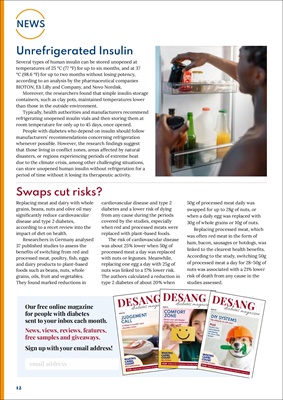
12
NEWS
Unrefrigerated Insulin
Several types of human insulin can be stored unopened at
temperatures of 25 °C (77 °F) for up to six months, and at 37
°C (98.6 °F) for up to two months without losing potency,
according to an analysis by the pharmaceutical companies
BIOTON, Eli Lilly and Company, and Novo Nordisk.
Moreover, the researchers found that simple insulin storage
containers, such as clay pots, maintained temperatures lower
than those in the outside environment.
Typically, health authorities and manufacturers recommend
refrigerating unopened insulin vials and then storing them at
room temperature for only up to 45 days, once opened.
People with diabetes who depend on insulin should follow
manufacturers' recommendations concerning refrigeration
whenever possible. However, the research findings suggest
that those living in conflict zones, areas affected by natural
disasters, or regions experiencing periods of extreme heat
due to the climate crisis, among other challenging situations,
can store unopened human insulin without refrigeration for a
period of time without it losing its therapeutic activity.
Swaps cut risks?
Replacing meat and dairy with whole
grains, beans, nuts and olive oil may
significantly reduce cardiovascular
disease and type 2 diabetes,
according to a recet review into the
impact of diet on health.
Researchers in Germany analysed
37 published studies to assess the
benefits of switching from red and
processed meat, poultry, fish, eggs
and dairy products to plant-based
foods such as beans, nuts, whole
grains, oils, fruit and vegetables.
They found marked reductions in
cardiovascular disease and type 2
diabetes and a lower risk of dying
from any cause during the periods
covered by the studies, especially
when red and processed meats were
replaced with plant-based foods.
The risk of cardiovascular disease
was about 25% lower when 50g of
processed meat a day was replaced
with nuts or legumes. Meanwhile,
replacing one egg a day with 25g of
nuts was linked to a 17% lower risk.
The authors calculated a reduction in
type 2 diabetes of about 20% when
50g of processed meat daily was
swapped for up to 28g of nuts, or
when a daily egg was replaced with
30g of whole grains or 10g of nuts.
Replacing processed meat, which
was often red meat in the form of
ham, bacon, sausages or hotdogs, was
linked to the clearest health benefits.
According to the study, switching 50g
of processed meat a day for 28-50g of
nuts was associated with a 21% lower
risk of death from any cause in the
studies assessed.
Our free online magazine
for people with diabetes
sent to your inbox each month.
News, views, reviews, features,
free samples and giveaways.
Sign up with your email address!
ISSUE 115
MAKING
CARBS
COUNT
MILK ALTERNATIVES
PLUS Diabetes kit • Giveaways • News (for T1 and T2) • Food News
JUDGEMENT
CALL
10 things to consider when
choosing a meter
PLUS
Who's Zooming who?
An update on digital
health delivery
ISSUE 111
MAKING
CARBS
COUNT
BELL PEPPERS
PLUS Diabetes kit • Giveaways • News (for T1 and T2) • Food News
COMFORT
ZONE
Roche's new micropump:
designed for user satisfaction
PLUS
Dexcom's next
generation G7 sensor ISSUE 119
MAKING
CARBS
COUNT
LUSCIOUS LYCHEES
PLUS Diabetes kit • Giveaways • News (for T1 and T2) • Food News
DIY SYSTEMS
The ultimate in self-care?
PLUS
Roche's new
meter launch:
introducing
the Accu-Chek
Instant
email address